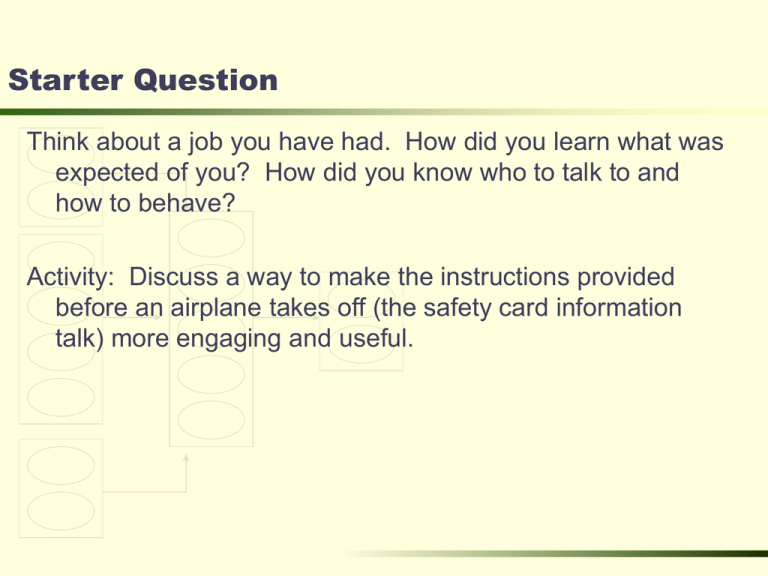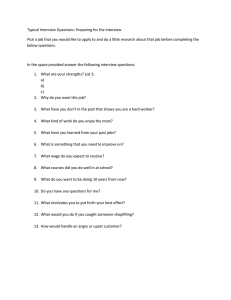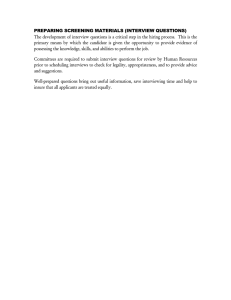
Starter Question
Think about a job you have had. How did you learn what was
expected of you? How did you know who to talk to and
how to behave?
Activity: Discuss a way to make the instructions provided
before an airplane takes off (the safety card information
talk) more engaging and useful.
Goals of Interviewing
Employer’s goals
Screening
Determine if you are their company’s “type of person”
Determine Knowledge, Skills, Abilities and Other characteristics (KSAO)
Figure out job assignment and salary
Skills testing
Assess your interpersonal and communication skills
Find out if you are open to change and criticism
Start assimilation
Introduce company norms
Cost effective and legal
Potential employee’s goals
Learn about the corporate culture, management, co-workers
Better understand the job and requirements
Determine growth opportunities and company’s potential
Company Perspective
Review
Identify Need
Create Job Description
Screen
Create Recquisition
Interview/Keep
apprised
Post Opening
Chapter 16
Offer
Collect Resumes
Organizational
Many of these steps are
Culture completed by recruiters and not
hiring managers
McGraw-Hill/Irwin
Copyright © 2009 by The McGraw-Hill Companies, Inc. All rights reserved.
Recruiting
Effective recruiting should:
Get the attention of the public
Motivate qualified applicants and screen out unqualified ones
Be cost effective
Be timely
Ways of recruiting:
Media advertisements
Only 10% of all jobs are advertised
Point of purchase
Employment agencies
Recruiters/Recruiting fairs
Web databases – 56% of all resumes sent via the internet
Employee referral programs
Prospective Employee
Target
-Company
-Job Type
-Salary
Author
-Cover Letter
Apply
Create Resume
Schedule Interview
Chapter 16
Search for Positions
-Web
Organizational
-Career Centers
Culture
-Social Network
McGraw-Hill/Irwin
Research Company
Interview
Copyright © 2009 by The McGraw-Hill Companies, Inc. All rights reserved.
Interviews Variations
Type
Questioning - who you are and how you think
Behavioral - what you do in certain situations
Simulations - actual performance in mock situations
Style
One-on-one
Serial or Return
Panel
Group
Medium
Face-to-face
Mediated (Telephone or Video conference)
Written
Interview Question Types
Clarifiers
I noticed a three-year gap between two of your jobs, could you tell me a little about that?
Disqualifiers
Can you work at least one weekend a month?
Past-focused
This job involves persuading employees to follow our safety rules. Tell us about a time
in the past when you had to persuade an employee to do something.
Future-focused
Suppose that you were scheduled to work on Saturday. A friend calls on Thursday and
says that you get to use a condo at the beach for free—but it has to be this weekend.
What would you do?
Skill determiners
Several months after working with a client, he calls and says that nothing works. What
could be going on?
Organizational fit
What type of work pace is best for you?
Interview Questions Part II
Illegal questions include those about:
Biology- pregnancy, disabilities, gender, etc.
Age
Partnering - sexual orientation, marital status, etc.
Religion
Military service
Guideline for handling questions
Catalog your strengths and successes
Identify weaknesses that are common or not damaging
Try to determine what is really being asked
Have a few clear examples that you can use
Rehearse answering likely questions
What you can do to increase success
How to prepare for interviews
Write a resume
Use active verbs
Detail relevant experience
Keep it short; one page is ideal
Compile a list of relevant references
Look professional - clothing and grooming
Develop themes you want to cover
Before
-Research company
-Come up with questions
-Find where interview is
-Arrive early
During
After
-Avoid over selling -Send thank you
-Ask for next step -Reflect
-Answer questions
-Address employer’s needs
Reasons for not being hired
Most frequent reasons for not hiring a candidate include*:
Poor personal appearance
“Know it all” and overbearing attitude
Lack of interest and enthusiasm
Inability to express ideas clearly
Rudeness
Did not listen well
Evasive and dodged questions
*According to a Northwestern University survey





